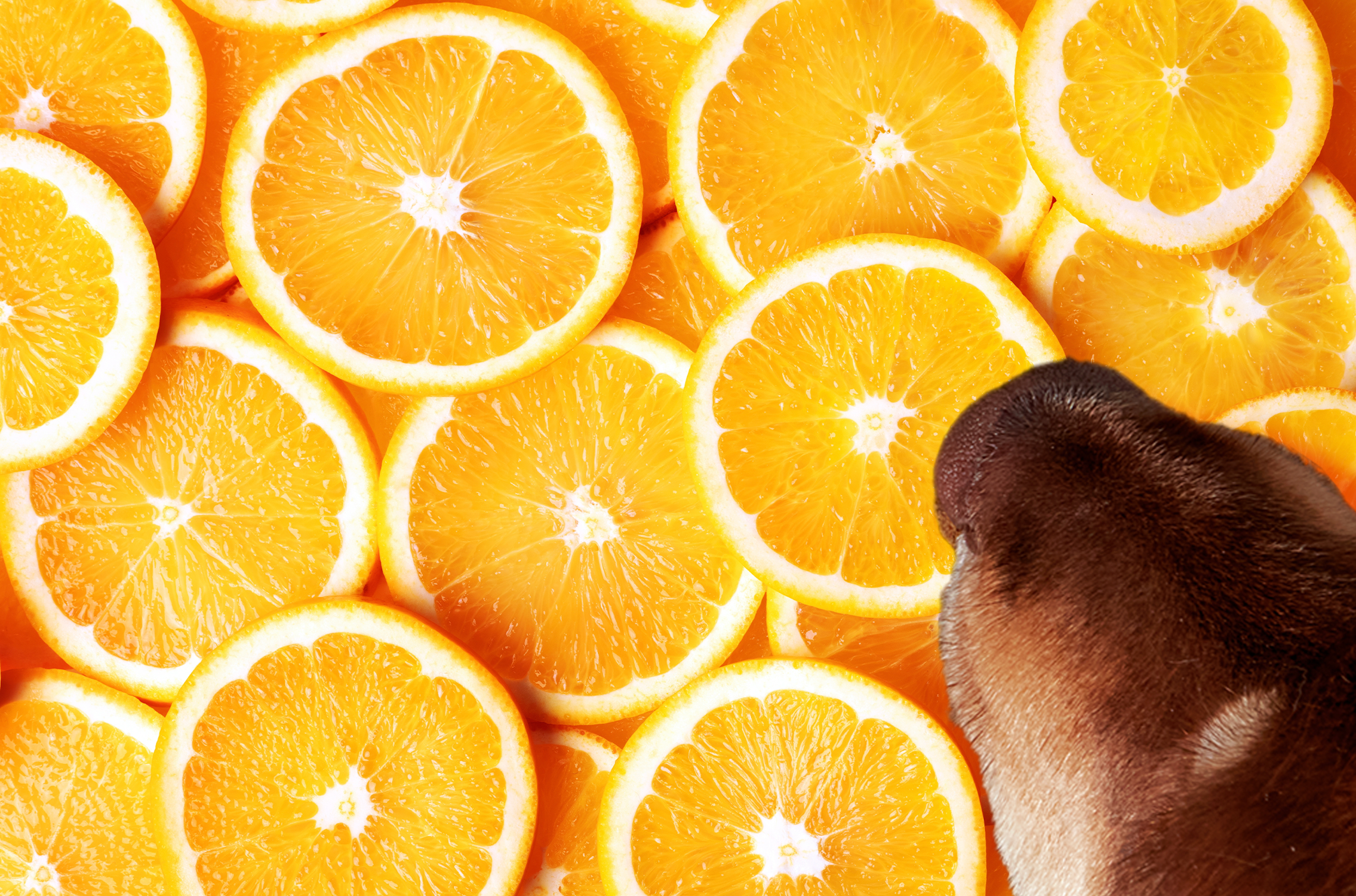Oranges — along with some other fruits like apples , bananas, and blueberries — make a delicious and healthy treat for dogs. In fact, pups can enjoy all types of oranges, including navel oranges, blood oranges, bergamot oranges, clementines, and more.
However, before you split an orange with your fruit-loving canine companion, there are a few things you should keep in mind to avoid giving your pup an upset stomach. Read on to learn everything you need to know about feeding dogs oranges, including: What are the health benefits of oranges for dogs? Can dogs eat orange peels? And, can dogs have orange juice? Plus, the answers to other common questions.
Are Oranges Good for Dogs?
The fleshy parts of oranges are loaded with nutrients that are beneficial for your dog, including:
- Potassium: essential for kidney function and supporting heart, muscle, and digestive health.
- Fiber: Helps maintain healthy digestion and prevents constipation.
- Vitamin C: rich in antioxidants to promote a healthy immune system.
How Many Oranges Can Dogs Eat?
The size and breed of your dog affects how their body will digest oranges. A Husky or German Shepherd might be able to have 2 pieces of an orange without any problems, while smaller breeds like Yorkies or Pomeranians would probably get an upset stomach.
Another thing to keep in mind is that the same amount of oranges would make up a much higher proportion of a small dog's daily calorie and sugar intake than a larger dog’s.
That said, even though oranges are a healthy treat for dogs, they should only be given in small amounts. In fact, treats of any kind should make up no more than 10% of your dog's overall diet — the other 90% should come from a well-balanced dog food.
Here are some general portion guidelines for feeding dogs oranges, based on weight and breed size:
- Extra-small dogs (2–20 pounds) = ½ orange segment. Examples: Yorkies, Chihuahuas, Pomeranians, Pugs.
- Small dogs (21-30 pounds) = ½ orange segment. Examples: Basenjis, Beagles, Mini Australian Shepherds.
- Medium dogs (31–50 pounds) = 1 orange segment. Examples: Basset Hounds, Border Collies, Australian Cattle Dogs.
- Large dogs (51–90 pounds) = 1 to 2 orange segments. Examples: Pit Bulls, German Shepherds, Labs, Australian Shepherds.
- Extra-large dogs (91+ pounds) = 2 orange segments. Examples: Newfoundlands, Bernese Mountain Dogs, Saint Bernards, Great Pyrenees.
As mentioned earlier, overdoing it on oranges can give your pup an upset stomach, due to the high sugar and citrus content in this citrus fruit. When feeding your pup oranges, keep an eye out for these symptoms, and call your vet if you see any of the following:
- Diarrhea
- Vomiting
- Decreased appetite or loss of appetite
- Looking uncomfortable
- Licking their lips
Can Oranges be Bad for Dogs?
Oranges are high in sugar — which is exactly what makes them so tasty for humans and pups alike. The thing is, the high sugar content also means higher calories, so pet parents of overweight dogs might want to avoid giving their pups oranges. Diabetic dogs should also avoid oranges because eating them can cause a spike in their insulin levels.
Before treating your pup to a piece of an orange, make sure to remove all of the seeds. Orange seeds contain trace amounts of cyanide — and while eating a few orange seeds poses little risk for your dog, it’s still safest to remove them altogether.
The acid in citrus may also give your pup an upset stomach. When in doubt, start small — give your dog a very small bit of an orange and see how they handle it. If you don't see any side effects, then you can treat them to a little bit more next time.
Serving Suggestions for Feeding Dogs Oranges
There are many ways to safely feed your dog oranges — just make sure to always wash the orange first. Then, remove the peel and seeds, and cut it into bite-sized pieces to prevent choking or an intestinal blockage.
Here are a few of our favorite, tasty ways to treat your pup to a citrusy snack:
- Fresh orange slices: Follow the portion guidelines outlined earlier in this article.
- As a food topper: Chop or blend orange pieces, and top off your dog’s food with the mixture.
- Frozen in a toy or treat dispenser: Blend some orange pieces, pour them into your dog's toy, and freeze it for a refreshing treat.
- In a fruit smoothie: Blend orange pieces with other dog-safe fruits like apples, bananas, blueberries, and strawberries. Top off your pup’s food with the mixture, or freeze it in an ice cube tray for a cooling snack.
- Mixed into yogurt: Blend or mash up orange pieces and mix them with plain, sugar-free, xylitol-free yogurt (that last part is very important, as xylitol is toxic to dogs).
- Frozen “pupsicles”: Put orange pieces in the blender, then pour into an ice cube tray and freeze.
- Dog-safe ice cream: Blend frozen orange pieces with unsweetened, plain, xylitol-free yogurt.
- Dehydrated: If you have a dehydrator at home, you can make dehydrated orange pieces. Avoid any store-bought dehydrated fruits — they usually contain added sugar and preservatives.
FAQs
Can Dogs Eat Orange Peels?
Like orange seeds, orange peels may contain toxic compounds that are harmful to dogs. They can also be tough on your pup’s digestive system, causing an upset stomach or even an intestinal blockage. To play it safe, always remove the orange peel and seeds before feeding this fruit to your little buddy.
Can Dogs Have Orange Juice?
It’s not recommended to give your dog orange juice. It’s concentrated with sugars and citric acid that can cause gastrointestinal issues for your pup. Store-bought OJ may also contain added ingredients that could be harmful to your dog.
Can Puppies Eat Oranges?
Yes, puppies can eat oranges — but, as with adult dogs, moderation is key. A bite-sized piece of orange won’t hurt your puppy, but keep in mind that their gut is more sensitive than that of an older dog. As always, remove the orange peel and seeds before giving your pup this tasty treat.
It’s best to limit treats, and to start small when introducing your puppy to new foods like oranges. If you notice any unusual symptoms, make sure you stop feeding your puppy oranges and call your vet immediately.
Can Dogs Have Other Types of Citrus?
The peels and seeds of all citrus fruits can cause gastrointestinal issues, but the fleshy parts of fruits like lemons, limes, and grapefruits are edible for dogs. The thing is, most pups don’t like the tartness of these other citrus fruits, so it’s probably best to feed them other dog-friendly fruits instead, including:
We’re especially fond of nutrient-packed apples, blueberries, and bananas — these fruits are considered dog superfoods and can be found in recipes like our Jinx kibble and Tiny Treats.
At Jinx, we're here to upgrade the way you care for your dog by providing holistic nutrition made with thoughtful formulation, real ingredients, and a whole lot of love.

